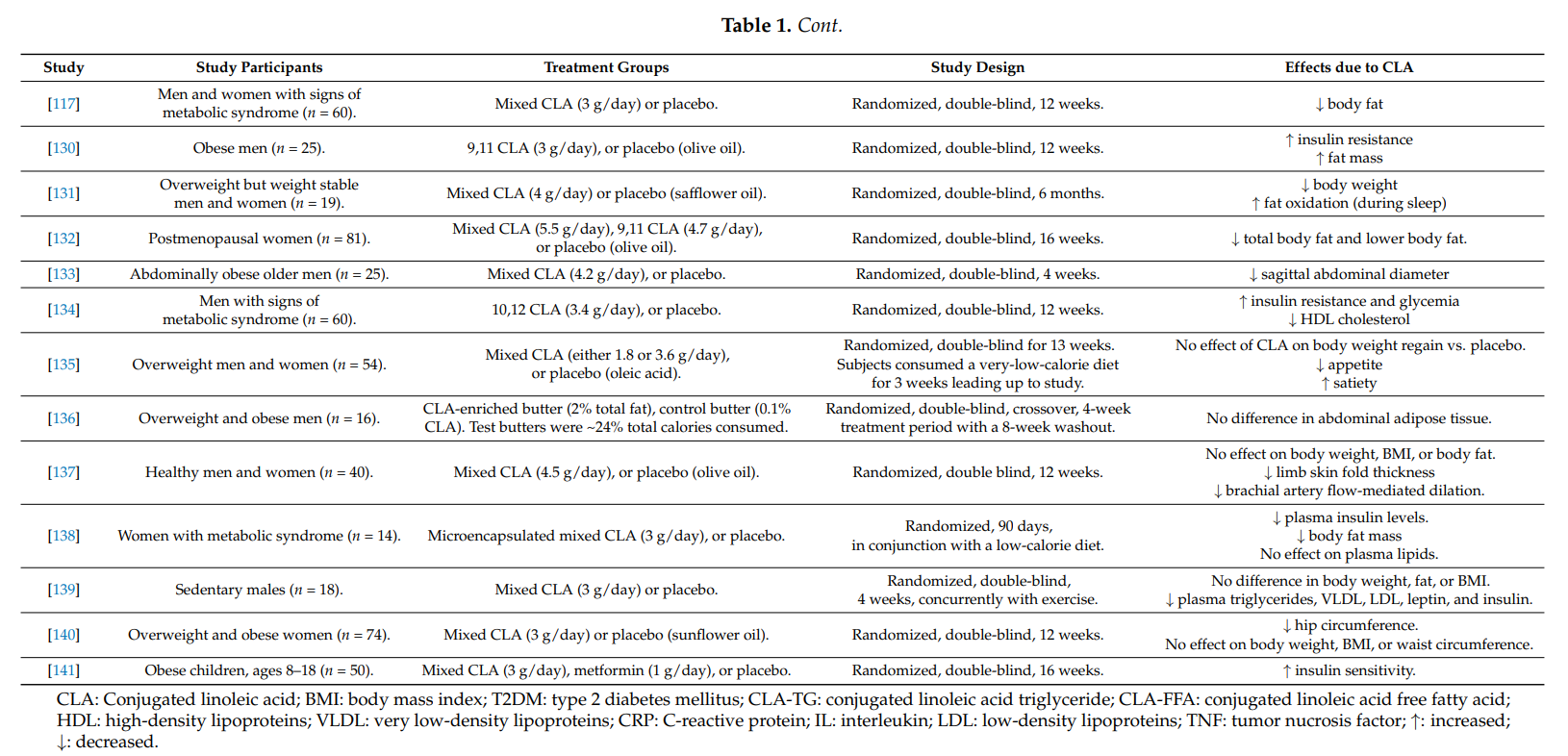Do you know about CLA? And what are its health benefits & how it’s proposed as an anti-obesity supplement? Let’s take a detailed review of CLA.
In this article, you will learn about CLA, sources, potential health benefits, researchers’ take on its weight loss function, side effects & prescribed dosage.
What is CLA?
Conjugated Linoleic Acids (CLA) are omega-6 fatty acids (healthy fats). The word conjugated in the name denotes the arrangement of double bonds in fatty acid molecules. There are 28 different forms of CLA; the only difference in these forms is the position of double bonds.
CLA is classified as natural polyunsaturated trans-fat. Polyunsaturated fats are essential fatty acids that can help lower your LDL (bad) cholesterol. But trans fat is known to increase your bad cholesterol & decrease your HDL (good) cholesterol. The reason why research studies indicated the CLA effect on humans is inconsistent & inconclusive.
CLA is natural tans-fat found in many healthy foods. Studies suggest natural trans fat (CLA) is different from industry-produced trans-fat; CLA does not exhibit negative health benefits as artificially produced trans-fat. American Heart Association (AHA) associates industry made trans-fat to a higher risk of heart ailments.
CLA is being advised as an anti-obesity supplement. The reason being, CLA may help lower fat deposits in the body & increase immunity. CLA is also used to treat cancer, hardening of arteries & weight problems. However, CLA seems safe, but researchers disagree about its health benefits. CLA shows significant anti-obesity effects in animal studies, but the results in human studies are uncertain.
Sources of CLA
Natural sources of CLA is meat, milk & milk products of ruminants. Ruminants are large herbivorous mammals that acquire energy from plant-based food by fermenting first in a special stomach (rumen) before digestion. Cows, goats, sheep, and deer are ruminants.
The amount of CLA present in foods depend on what the animals are being fed. Many studies suggest that products from grass-fed cows have 300 to 500% higher CLA content than grain-fed cows. Feeding the ruminants with plant sources of CLA (sunflower oil, soyabean oil, linseed oil) can also increase the content of CLA in their milk. Many studies suggested that grass-based diets increase fatty acid ratios, CLA & omega content, and increase healthy antioxidants in beef.
CLA supplements are also present in the market. CLA in these supplements is not derived from natural foods; these are prepared by chemically modifying linoleic acids in the lab. There is no regularity in CLA content in supplements, as CLA content is usually much higher than CLA content present in natural foods. That’s the reason CLA supplements do not provide the same benefit as CLA present natural foods.
Most people ingest CLA from their diets. The average intake of CLA is 150 milligrams per day for women and 211 milligrams per day for men. Many people consume CLA by drinking rich butter- bulletproof coffee.
Some mushrooms like Agaricus Bisporus are one of the rare non-animal sources of CLA. Eggs hatched from chicken that has been fed CLA rich foods also have CLA rich content.
Potential Benefits of CLA
Consuming CLA from foods (natural sources) may reduce the risk of various diseases like type-2 diabetes, cancer, etc. If you drink milk from grass-fed animals, natural CLA in those milk & milk products decreases the risk of heart ailments. The decrease in the risk of heart problems is also due to other protective vitamins present in grass-fed animals, like vitamin K2 and vitamin A.
Source: https://www.rxlist.com/conjugated_linoleic_acid/supplements.htm
Studies also suggested that people who consume CLA have improved metabolism & susceptibility to illness.

What 2015 Review Paper Say?
As per the 2015 review paper, CLA has a role in breaking down fat molecules in the human body. The reason may be why people believe consuming CLA helps in weight loss.
Source: https://www.ncbi.nlm.nih.gov/pmc/articles/PMC4429457/
What 2017 Study Say?
2017 study about CLA has shown weight loss effects but with fewer benefits.
The study observed two groups of obese mice with metabolic syndrome for checking weight loss effects. One group was given CLA rich diet; another group was on a calorie restriction diet.
After observation, the study concluded that both the groups had lost the same amount of weight. But CLA fed mice lost subcutaneous, protective, and healthy fat, but not harmful visceral fat. And calorie-restrictied mice had shown a decrease in blood sugar levels & improved diabetes, as there was a reduction in visceral fat.
Studies suggested that CLA foods had a role in weight loss, but not better than standard weight loss methods.
Source: https://ods.od.nih.gov/factsheets/WeightLoss-HealthProfessional/
CLA is Possibly Effective
High blood pressure
Consuming CLA with ramipril (blood pressure tablets) seems to reduce more blood pressure than ramipril alone.
Obesity
Taking CLA may decrease fat in adults, but not body weight. CLA might reduce the hunger, but not as effective as the limited calorie intake process. Adding CLA to milk might show a decline in fat production in obese people. In children, 3 grams of CLA seems to reduce body fat.
There are various instances of CLA reducing body fat, but some research also stated that taking a particular form of CLA might raise the risk of type-2 diabetics and heart diseases.
Weight Loss Discussion Regarding CLA
Research scientists first discovered CLA for fighting cancer in mice and later observed CLA could reduce the fat levels of the human body.
As the craze of weight loss increases, interest in CLA also increases. There are potential weight loss treatments with CLA diets. Due to its effect on weight loss, CLA may be one of the world’s most studied weight loss supplements.
In animal studies, CLA proved to reduce body fat in many ways. But in human studies, the role of CLA is still uncertain.
In one of the studies conducted on animals, CLA was found to reduce food intake, increase the fat burning process, increase muscle mass & decrease overall fat production. Observation studies showed that the effect of CLA was more in the initial six months, then stagnant for two years. As per this study, CLA was found to reduce 1kilograms of body fat per week.
Yet, some studies with a combined review of around 18 controlled trials showed no effect at all. Another review study showed CLA to reduce 1.3 kilograms of weight than placebo induced weight loss treatments.
So, it has been observed that the weight loss effects of CLA are significant, but there can be a potential for side effects too.
Side Effects of CLA
Research studies suggest that taking small amounts of natural CLA in your diet can be beneficial. But you need to check with your dietician if you are taking CLA supplements. CLA present in supplements is formed by chemically altering linoleic acid (taken from vegetable oils). Moreover, supplemental doses contain much higher amounts of CLA than you get from dairy or meat (natural CLA sources).
In some cases, taking large amounts of CLA from natural sources is found to be less beneficial. Higher doses of CLA can accumulate a higher amount of fat in the liver, resulting in diabetes, heart diseases, stroke, etc.
Some studies in both animals & humans have shown that CLA can cause inflammation, insulin resistance, and decrease good (HDL) cholesterol. Some human studies have also demonstrated that reasonable doses of CLA supplements may cause side effects, like stomach upset, nausea, fatigue, diarrhoea, long term stress, etc.
When taken by mouth, CLA is considered in the ‘likely safe’ category in similar amounts found in foods. The ‘possibly safe’ class is taken by mouth in medicinal doses (amounts slightly higher than CLA content present in foods).
Due to these side-effects mentioned above, more research must be required to know every possible side-effect of CLA in humans.
CLA Is Probably Ineffective in Some Cases
CLA has been proved to be ineffective in the common cold & high cholesterol rise. There is insufficient evidence to know the effectiveness of CLA in allergies, asthma, hay fever, rectal cancer, breast cancer, colon disorder, and rheumatoid arthritis.
Some Precautions While Taking CLA
CLA is considered safe when taken by mouth. It is safe for pregnant & breastfeeding mothers in medicinal amounts. For children up to 6 months, there is no evidence for the safe amount of CLA to be given. Some studies have shown that CLA may worsen bleeding disorders and diabetes. It is advised to avoid taking CLA at least two weeks before surgery, as it may cause excessive bleeding during surgery.
Dosage
The United States Food & Drug Administration(FDA) allows CLA to be added to foods in GRAS (generally regarded as safe) doses. Most studies have concluded that doses of 3.2 to 6.5 grams of CLA are safe. One of the reviews even suggested that a minimum of 3 grams of CLA can be enough for weight loss. Doses up to 6 grams per day has been considered safe with no evidence of side effects. It will help if you keep in mind that an increase in doses would increase serious side effects.
Final Thoughts
Many studies touted CLA as an effective weight loss treatment. CLA pose no severe side effects till 6 grams per day, but no certainty if taken for the long term.
Losing weight may be the attractive health benefit of CLA, but now you know there are better ways to lose weight with higher health benefits. Official sources consider CLA safe, though many people may experience some side effects.
Still, more comprehensive research studies are necessary for finding out the significant role of CLA and its side effects on humans.
I hope you find the article helpful.
Do you have any further questions? Do ask in the comments section below.


